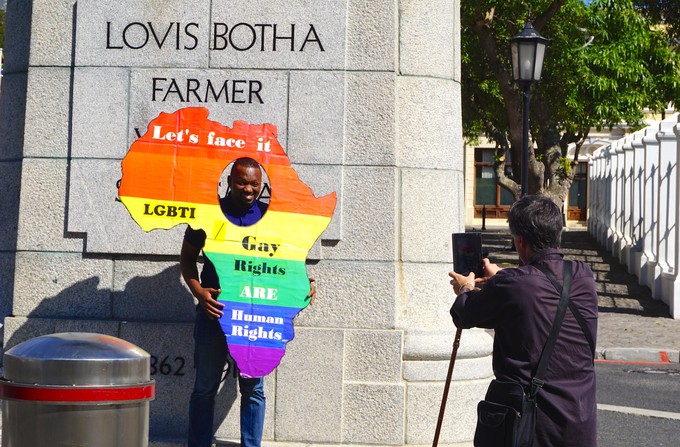Imaginative gay rights campaign launched
Scalabrini hopes to change attitudes in immigrant communities
Scalabrini Centre, a migrant rights and resources organisation, officially launched its ‘Let’s Face It’ campaign in March as part of an effort to promote gay and lesbian rights and highlight emerging hate crimes legislation. They’ve cited the 20th anniversary of South Africa’s Constitution, the first to recognise gay rights, as a fitting time to take up the issue.
In a photo-campaign they call “Pop Up Pride,” starting on Human Rights Day, the Human Rights team at Scalabrini has been taking a rainbow cutout of Africa around various areas in Cape Town.
The board contains information about gay and lesbian rights and why it isn’t Un-African, an idea they say is commonly used to oppose the rights of people with different sexual orientations on the continent. On the front it reads “Let’s Face It. LGBTI / Gay Rights ARE Human Rights,” and individuals can have their picture taken putting their face through a hole in the board.
The organisers hope to reach 1,000 photographs by Khumbulani Pride, an event on 21 May in Khayelitsha to commemorate victims of homophobic violence.
Once the project is complete, they plan to create a book of the photos to fundraise for African gay and lesbian communities.
Neil Goodwin, Human Rights Officer at Scalabrini, said the idea was born out of the intersectionality between homophobia and xenophobia.
“Regimes throughout Africa tend to use LGBTI communities as moral scapegoats, whipping up hysteria and hatred as a means to deflect attention from their own huge failings, greed and corruption—the same failings that force people to leave their homes in the first place to search for a better, safer life,” he said. “It is our role to find ways to make the links and encourage solidarity.”
In its work, Scalabrini occasionally comes across refugees who have experienced homophobic discrimination from other refugees. “We felt the need to address homophobia within the migrant communities that we work with,” Goodwin said.
As they walked through the streets on Thursday, Goodwin and Human Rights Intern Ruvimbo Tenga received very mixed reactions to their campaign.
“For a lot of people, it’s the first time they’ve ever openly been asked to take a stance on this,” he said. “It’s not really about changing minds but making people realise that there is an issue here.”
Reactions of passersby
Goodwin and Tenga walked to Parliament, asking passersby to join their campaign and take a photo with the rainbow Africa. Some excitedly joined; one truck driver raised his fist out of the window and shouted, “Gay Rights!” but was gone before Goodwin could photograph him. Others were a bit more hesitant or engaged in long conversations and asked a series of questions. Goodwin said they allow people not to show their faces in the photos if they don’t feel comfortable.
“Some people just can’t show their faces,” he said after photographing a gay man from Nigeria who declined to show his face. “They might be from other countries or communities where they or their families might be put in danger, especially if the photo is found on social media.”
Not everyone was so keen to join. Many walked past, smiling or laughing uncomfortably as they declined, while some showed disgust.
“No. No. This is not African. Go back to Europe,” one man said. Another called homosexuality an “abomination.” Many who declined to partake cited religious teachings. “God created Adam and Eve, not Adam and Steve.”
Scalabrini is working on a follow up documentary, “From the Same Soil Too,’ bringing together faith leaders to discuss gay and lesbian rights. “There’s a diversity of opinion within the religious communities,” Goodwin said.
“For some people, it’s like you’re going to go to hell. It’s a big deal,” he continued. “But we also have a lot of preconceptions. I’m pleasantly surprised because a lot of the people you assume would never associate will just say yes.”
As of the end of Thursday’s walk, the campaign has reached 517 faces, but for Goodwin, the impact goes beyond the number of photographs they take.
“We might get 1000 faces, but what matters is that we spoke to 5,000 and were probably seen by 10,000.”
© 2016 GroundUp. 
This article is licensed under a Creative Commons Attribution-NoDerivatives 4.0 International License.
You may republish this article, so long as you credit the authors and GroundUp, and do not change the text. Please include a link back to the original article.



